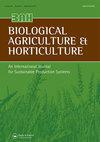Use of conventional and innovative organic materials as alternatives to black plastic mulch to suppress weeds in tomato production
IF 1.6
4区 农林科学
Q3 AGRONOMY
引用次数: 4
Abstract
ABSTRACT Controversial issues have been raised regarding the use of plastic mulches, as they can have a destructive effect on agricultural production systems and because of the reliance on fossil fuels for the manufacturing. Investigating the use of organic materials as alternatives to black plastic mulch is thus crucial to enhance both the productivity and the sustainability of agricultural systems. A field experiment was carried out in three years, assessing the efficacy of several organic mulch materials, in comparison with black plastic mulch, for suppressing weeds in tomato production. The results showed that, mulching with shredded date leaves + sawdust, had the highest inhibiting impact in reducing the total weed density by approximately up to 31.3 weeds m-2 at 70 days after transplanting in all three years. The highest marketable yield of the tomatoes was obtained for plants grown with shredded date leaves + sawdust mulch in 2015, 2016 and 2017. Additionally, mulching with coco fibre, sawdust, wheat straw + sawdust, corn residue + sawdust and wood chips + sawdust resulted in similar values for marketable yield as the black plastic. The results revealed that shredded date leaves + sawdust could be a practical alternative to the use of black plastic in the production of processing tomatoes. The use of wheat straw + sawdust, barley straw + sawdust, rice straw + sawdust, corn residue + sawdust, coco fibre + sawdust, sawdust and especially coco fibre, as replacements for black plastic, would be rational options when there is no access to shredded date leaves + sawdust.使用传统和创新的有机材料替代黑色塑料覆盖物抑制番茄生产中的杂草
由于塑料地膜对农业生产系统的破坏性影响以及生产过程中对化石燃料的依赖,塑料地膜的使用引起了争议。因此,研究使用有机材料作为黑色塑料覆盖物的替代品对于提高农业系统的生产力和可持续性至关重要。在三年的时间里进行了一项田间试验,评估了几种有机地膜材料对番茄生产中杂草的抑制效果,并与黑色塑料地膜进行了比较。结果表明,在移栽后70 d,红枣叶碎+木屑覆盖对总杂草密度的抑制效果最好,可减少约31.3株m-2。2015年、2016年和2017年,用枣叶碎+木屑覆盖种植的番茄获得了最高的市场产量。此外,覆盖可可纤维、锯末、麦秆+锯末、玉米渣+锯末和木屑+锯末的可销售产量与黑塑料相似。研究结果表明,在加工番茄的生产过程中,切碎的枣叶+锯末可能是使用黑色塑料的一种实用替代品。使用麦秸+锯末,大麦秸秆+锯末,水稻秸秆+锯末,玉米渣+锯末,可可纤维+锯末,锯末,特别是可可纤维,作为黑色塑料的替代品,在没有切碎的枣叶+锯末的情况下,将是合理的选择。
本文章由计算机程序翻译,如有差异,请以英文原文为准。
求助全文
约1分钟内获得全文
求助全文
来源期刊
CiteScore
3.30
自引率
6.70%
发文量
18
审稿时长
>36 weeks
期刊介绍:
Biological Agriculture & Horticulture aims to act as the central focus for a wide range of studies into alternative systems of husbandry, and particularly the biological or organic approach to food production. The Journal publishes work of a sound scientific or economic nature related to any aspect of biological husbandry in agriculture, horticulture and forestry in both temperate and tropical conditions, including energy and water utilization, and environmental impact.

 求助内容:
求助内容: 应助结果提醒方式:
应助结果提醒方式:


